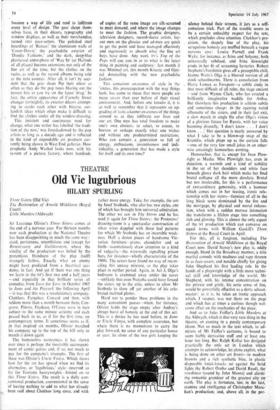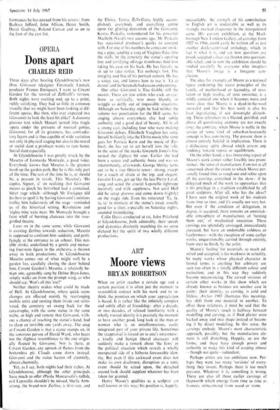Three Sisters (Old Vic)
THEATRE
Old Vic lugubrious
HILARY SPURLING
The Restoration of Arnold Middleton (Royal Court) Little Murders (Aldwych) Sir Laurence Olivier's Three Sisters comes at the end of a nervous year. For thirteen months now each production at the National Theatre has been disappointing in much the same way : staid, portentous, unambitious and (except for Rosencrantz and Guildenstern, where the vitality of the production was belied by the pretentious blandness of the play itself) strangely listless. Exactly what an enemy might have predicted from a theatrical aca- demy, in fact. And yet if there was one thing we learn in the rrr's first two and a half years —and especially in that brilliant series of comedies from Love for Love in October 1965 to Juno and the Paycock the following April —it was that this was a revolutionary company. Chekhov, Farquhar, Coward and then, with seldom more than a month between them, Con- greve, Pinero, Feydeau, O'Casey were in turn subject to the same minute scrutiny and each passed back to us, as if for the first time, on contemporary terms. It sometimes seems as if, in that inspired six months, Olivier marched his company up to the top of the hill only to march it down again.
The humourless earnestness it has shown ever since is perhaps the inevitable accompani- ment of comic genius and, if so, not much to pay for the company's triumphs. The first of these was Olivier's Uncle Vanya. Which shows how far the rot has spread when we find its alternative, or 'lugubrious,' style—reserved so far for Teutonic heavyweights—foisted on to this Three Sisters. The result is a dully con- ventional production, conventional in the sense of having nothing to add to what has already been said about Chekhov long since, and with
rather more energy. Take, for example, the sets by Josef Svoboda, who also has two styles, one of which has brought him universal admiration. The other we saw in The Storm and he has used it again for Three Sisters: the Prozorovs' drawing-room is a spectacular construction of silver wires dappled with those leaf patterns for which Mr Svoboda has an incurable weak- ness. Half a dozen pieces of handsome Vic- torian furniture—piano, chandelier and so forth—ostentatiously draw attention to a kind of vulgarity—the wire-walls signalling prison bars, for instance—wholly characteristic of the 1960s. The actors have found no way of recon- ciling this uneasy mixture, so the play takes place in neither period. Again, in Act 3, Olga's bedroom is crammed away under the eaves —unlikely that even Natasha could have forced the sisters up to the attic, unless to allow Mr Svoboda to show off yet another of his cele- brated inclined planes.
Hard not to ponder these problems in the many convenient pauses—when, for instance, Olivier holds the stage empty after Audrey's abrupt burst of honesty at the end of this act. This is a device he has used before, in Juno or Uncle Vanya, with complete assurance, but where there is no momentum to carry the play forward, no sense of any particular house or year, let alone of the two girls keeping the silence behind their screens, it jars as .a self- ' conscious trick. Part of the trouble seems to be a certain unhealthy respect for the text, which precludes close attention. Chekhov's pre- cision, the shapely line of the play, his scrupulous honesty are muffled- beneath a vague nervous awe: Louise Purnell and Frank Wylie, for instance, as Irina and Solyony, both unnaturally subdued, and Irina downright crude in her fit of screaming hysterics. Robert Stephens's Vershinin gives off a perceptible chill, Jeanne Watts's Olga is a blurred version of all stock schoolmarms. There is consolation from Harry Lomax as Ferapont—a subtle study in that most difficult of all roles, the stage ancient —and from Wynne Clark, who has created a brilliantly imaginative waddle for Anfisa. But elsewhere this production is seldom subtle and sometimes cheap: in the opening weird silhouette of the sisters, and in their last exit, a slow march in single file after Olga's vision of a glorious future for Russia, with her voice booming dismally, 'I don't know . . . I don't know . . .' Her question is neatly answered by what I take to be a blown-up snap of the Kremlin, which plops up as the curtain falls —one of the very few small jokes in an other- wise amazingly humourless evening.
Humourless, that is, except for Joan Plow- right as Masha. Miss Plowright has, even in dejection, a warmth and a kind of nobility in the set of her shoulders and white face beneath glossy dark hair which make her final brutal collapse all the more desolate. Brutal but not intolerable, for this is a performance of extraordinary generosity, with a humour which comes out in her teasing, ironic rela- tionship with her sisters—funniest of all in the long .bleak scene dominated by the fire and the mortgage, by physical and moral exhaus- tion, when with a sudden morose intonation she transforms a lifeless stage into something rich and glowing. This is almost the only aspect of the NT production which can converse on equal terms with William Gaskill's Three. Sisters at the Royal Court in April.
For this, all is forgiven, including The Restoration of Arnold Middleton at the Royal. Court now. David Storey's new play is, oddly enough, bland in the Broadway manner, a trite marital comedy with madness and rape thrown in as face-savers, and notable chiefly for giving John Shepherd his first leading role. In the hands of a playwright with a little more techni- cal skill and knowledge of the world, Mr Shepherd, with his intense concentration on the private and grisly, his eerie sense of fun, would be powerfully effective as a dotty school- master: as it is, he takes an ironic approach which, I. suspect, was not there on the page and which has at times a curious though wel- come effect on the mechanics of the piece.
And so to Jules Feiffer's Little Murders at the Aldwych, which is that very rare thing in the theatre, an evening in a purely contemporary idiom. Not so much in the text which, to ad- mirers of Mr Feiffer's cartoons, is bound to seem feebly derivative stuff and at 'least One hour too long. But Ralph Koltai has designed practically the only set in London which attempts to acknowledge, let alone exploit, what is being done on other art fronts—in modern browns and a rich synthetic blue, in plastic disposable knick-knacks set against the lurid lights (by Robert Ornbo and David Read), the rowdiness (sound by John Moore) and alarm- ing romantic grandeur of the greatest city on- earth. The play is -fortunate, 'too, in the tact, stamina and intelligence of Christopher Mora- han's production; and, above all, in the per-
formances he has coaxed from his actors: from Barbara Jefford, John Allison, Derek Smith, Derek Godfrey, Roland Curran and so on to the foot of the cast list.































 Previous page
Previous page